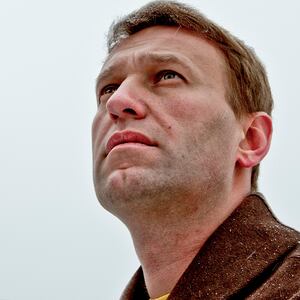MOSCOW—How far will the government of President Vladimir Putin go to silence opposition figure Alexei Navalny? At a moment when more than 1,400 people have been arrested at peaceful protests in Moscow, and the challenges to Putin’s presidency are mounting, there’s now widespread speculation that Navalny just fell prey to yet another Kremlin poison plot.
Navalny’s trips to jail have become so frequent it almost seems he’s commuting to prison. Every time he calls his supporters to an anti-government rally, authorities round him up: the usual suspect calling for less corruption, more democracy. This year alone, the creator of the Moscow-based Anti-Corruption Foundation has spent 90 days behind bars, and his following just keeps growing. More than five million Russians, most of them in their twenties and thirties, read Navalny’s sharp, witty, often devastating investigations on social media. His courage is such that the arrests only burnish his popularity.
But on Sunday—a day when more than 1,400 demonstrators were arrested in a brutal police crackdown—Navalny’s wife Yulia went to visit him at the prison where had been locked up in solitary confinement since July 24.
Navalny wasn’t there. “Don’t you know?” said a staffer at the jail. “An ambulance took him away to a hospital with some kind of strong allergic reaction.” Yulia knows her husband: he never would have agreed to any medical treatment if the situation was not serious.
The next thing Yulia and the Foundation’s team members learned was that the “allergy” caused Navalny’s eyes and face to turn red and swell.
Their concerns turned to alarm. There is a long list of poison victims Putin considers dangerous critics or even traitors. Among them was journalist Anna Politkovskaya, who was given some sort of toxic substance in a cup of tea in 2004, but survived, only to be gunned down in 2006. Ukrainian politician and liberal lawmaker Victor Yushchenko was poisoned, nearly died, and was permanently disfigured while running for the Ukrainian presidency in 2004. In Britain the 2006 murder of former KGB and FSB officer Alexander Litvinenko with the rare isotope Polonium-210, and the attempted murder last year of ex-GRU agent Sergei Skripal, using the exotic nerve agent novichok, are notorious.
No wonder, then, that Navalny’s friend and spokeswoman, Kira Yarmish, told The Daily Beast, “We are extremely worried about Alexei, it could be some chemical agent sprayed in his cell or on his bed.”
She said, “A crowd of young people came to the hospital to support their leader last night and police detained 21 people, which made Navalny’s supporters even angrier.”
The incident comes at what starts to feel like an inflection point.
The arrests and interrogations of Putin’s critics began last week in anticipation of elections for Moscow’s city council. Police went to all the candidates who hoped to take part this September, searched the politicians’ homes at night, confiscated computers, cell phones and detained everybody who might lead political rallies.
Over the weekend harassment intensified. “Police detained us early in the morning [Saturday] and let us go in late evening, so we would not go to the protest,” Yarmish said. “The Kremlin miscalculated their strategy: our supporters joined non-sanctioned rallies, in spite of the risk. People have changed in Russia, there is no tolerance left for humiliations.”
Former KGB officer Gennady Gudkov took Navalny’s sickness very seriously. “Russian secret police poisoned people for hundreds of years, there is a huge scientific field here devoted to this this ugly business,” Gudkov told The Daily Beast. “A secret agent could have shaken Navalny’s hand or put something in his food to permanently damage the politician’s face or his eyesight.” Gudkov sounded angry: “Last week the law stopped working in Moscow.”
Gudkov’s son, Dmitry Gudkov, is currently under arrest. “Some three men abducted Dmitry from a food store yesterday without introducing themselves, without any explanation,” Gudkov said on Monday. “The methods this criminal gang use against the opposition politicians remind me of a military junta: armed men keep Dmitry Gudkov at the police station right now, illegally; they could ruin his health, since no law stops them now.”
Another opposition rally is planned for this weekend. The organizers demand opposition candidates be freed and registered for the Moscow city council elections.
Maksim Lyskov, a 27-year-old economist, said that after he read about Navalny’s hospitalization he decided to join the upcoming rally. “A few years ago police broke Navalny’s wrist, now it looks like they poisoned him, so we should all rise, speak out, so the guys in the Kremlin hear us,” Lyskov said. “I am sure Navalny has made mistakes, he is not an angel, but his anti-corruption reports have opened my mind to what is really happening and the Kremlin seems to be scared of him.”
On Monday afternoon Navalny was moved from the hospital back to his jail cell, raising new worries.
“Doctors and Navalny’s colleagues believe that this is highly unprofessional and dangerous,” Yarmish said. “If he reacts to the mysterious chemicals a second time, the medicine that has been helping him might not work. He should stay at the hospital.”
Ilya Azar, a 35-year-old member of the Moscow city council, believes that the repressive strategy is short-sighted. “I was outraged when I saw police detaining people outside Navalny’s hospital last night. I was thinking about the beginning of the Maidan revolution in Ukraine: it grew massive, after police beat up and arrested a few young activists.” So massive, indeed, that it brought down the government in Ukraine in 2014.
Moscow authorities mobilized thousands of National Guard forces last weekend to stop the non-sanctioned protest. One man named Konstantin Kovalov happened to run by the Moscow city hall several hours before the beginning of the opposition rally on Saturday only to be beaten up by police, who broke his leg. An ambulance took a Moscow council member, Alexandra Parushina, to a hospital after a police club cracked her head.
“These brutal methods just stir up the protest, this is not a smart strategy; somebody out there seems to be in hysterics,” Azar told The Daily Beast.







